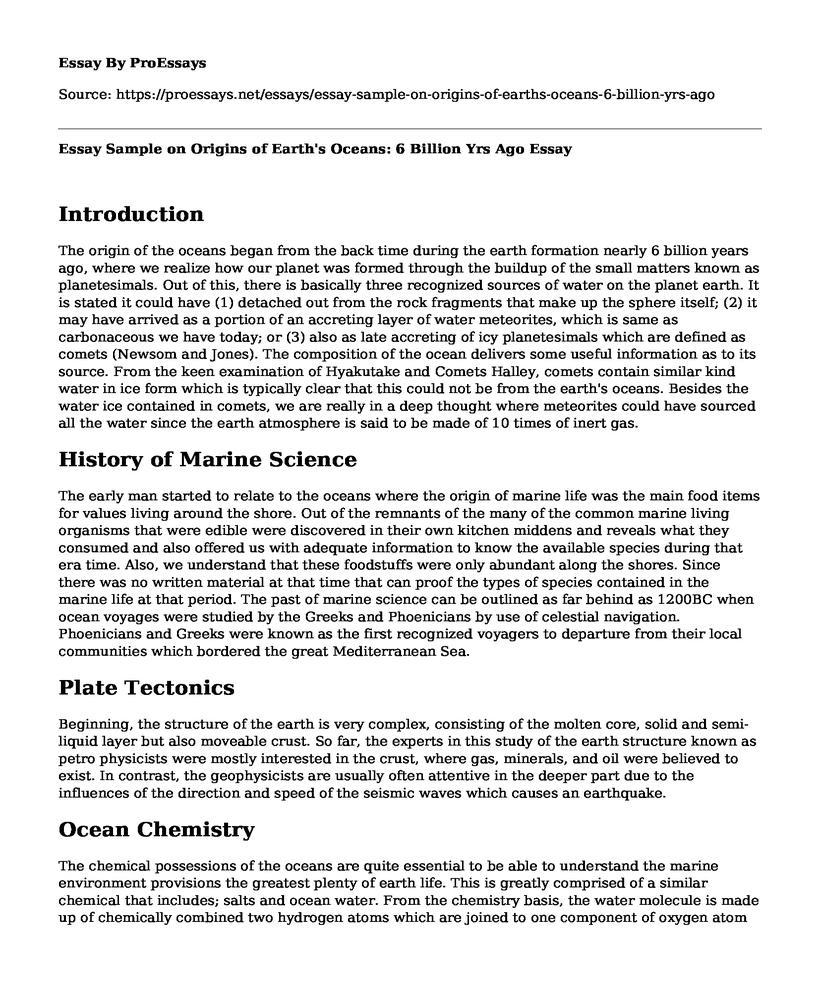Introduction
The origin of the oceans began from the back time during the earth formation nearly 6 billion years ago, where we realize how our planet was formed through the buildup of the small matters known as planetesimals. Out of this, there is basically three recognized sources of water on the planet earth. It is stated it could have (1) detached out from the rock fragments that make up the sphere itself; (2) it may have arrived as a portion of an accreting layer of water meteorites, which is same as carbonaceous we have today; or (3) also as late accreting of icy planetesimals which are defined as comets (Newsom and Jones). The composition of the ocean delivers some useful information as to its source. From the keen examination of Hyakutake and Comets Halley, comets contain similar kind water in ice form which is typically clear that this could not be from the earth's oceans. Besides the water ice contained in comets, we are really in a deep thought where meteorites could have sourced all the water since the earth atmosphere is said to be made of 10 times of inert gas.
History of Marine Science
The early man started to relate to the oceans where the origin of marine life was the main food items for values living around the shore. Out of the remnants of the many of the common marine living organisms that were edible were discovered in their own kitchen middens and reveals what they consumed and also offered us with adequate information to know the available species during that era time. Also, we understand that these foodstuffs were only abundant along the shores. Since there was no written material at that time that can proof the types of species contained in the marine life at that period. The past of marine science can be outlined as far behind as 1200BC when ocean voyages were studied by the Greeks and Phoenicians by use of celestial navigation. Phoenicians and Greeks were known as the first recognized voyagers to departure from their local communities which bordered the great Mediterranean Sea.
Plate Tectonics
Beginning, the structure of the earth is very complex, consisting of the molten core, solid and semi-liquid layer but also moveable crust. So far, the experts in this study of the earth structure known as petro physicists were mostly interested in the crust, where gas, minerals, and oil were believed to exist. In contrast, the geophysicists are usually often attentive in the deeper part due to the influences of the direction and speed of the seismic waves which causes an earthquake.
Ocean Chemistry
The chemical possessions of the oceans are quite essential to be able to understand the marine environment provisions the greatest plenty of earth life. This is greatly comprised of a similar chemical that includes; salts and ocean water. From the chemistry basis, the water molecule is made up of chemically combined two hydrogen atoms which are joined to one component of oxygen atom by weak hydrogen bonds, written by the formula H2O (Ocean Chemistry). This is out a positively charged atom of hydrogen which is an attracted to a slightly a negatively charged atom of oxygen to form a water bond molecule. Water is available in the marine environment as a solid, liquid, and a gas controlled by temperature. The heat from the earth surface makes the water molecules to move thus having an impact on each other. In the ocean, there is the support of aquatic life by providing an adaptive environment for the creature living there. Waves and tides are also a resultant action that happens in different climate seasonal times.
Work Cited
Canfield, Donald E. "A new model for Proterozoic ocean chemistry." Nature 396.6710 (1998): 450.
Hempel, Gotthilf. Early life history of marine fish: the egg stage. No. QL 639.25. H45 1979. WA, USA: Washington Sea Grant, 1979.
Jones, E. P., and L. G. Anderson. "On the origin of the chemical properties of the Arctic Ocean halocline." Journal of Geophysical Research: Oceans 91.C9 (1986): 10759-10767.
Weaver, Barry L. "The origin of ocean island basalt end-member compositions: trace element and isotopic constraints." Earth and Planetary Science Letters 104.2-4 (1991): 381-397.
Cite this page
Essay Sample on Origins of Earth's Oceans: 6 Billion Yrs Ago. (2023, Jan 19). Retrieved from https://proessays.net/essays/essay-sample-on-origins-of-earths-oceans-6-billion-yrs-ago
If you are the original author of this essay and no longer wish to have it published on the ProEssays website, please click below to request its removal:
- History on Wells Fargo and how it pertains to California's State History
- Health Effect of Radiation Essay
- Research Paper on Examining the Reaction of Acid-Base
- Colonizing Kepler 452-B Essay Example
- Overview of the Protein Molecule Paper Example
- Research Paper on Lithium Chloride's Impact on Exploratory Behaviour & Innate Fear
- Paper Example on Alkaline Phosphatase: Enzyme of Human Tissues







